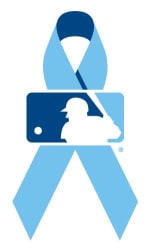June 04, 2013 — SANTA MONICA, CA — Major League Baseball and teams across the country are once again stepping up to the plate to hit home runs for prostate cancer research and encourage fans to Keep Dad in the Game as part of the 18th annual Home Run Challenge. The program, coordinated by the Prostate Cancer Foundation (PCF), will take place during the 16 days leading up to June 16—Fathers’ Day—and will help raise crucial awareness for prostate cancer and much needed research funding.
 During this year’s Home Run Challenge, Major League Baseball (MLB) and PCF will encourage baseball fans to make a pledge–ranging from $0.10 to $1,000–for every home run hit during all 84 MLB games played between Tuesday, June 11 and Father’s Day, June 16. Last year, 150 home runs were hit, raising more than $2.2 million for prostate cancer research. To make a pledge for the 2013 Home Run Challenge baseball fans can visit www.homerunchallenge.org.
During this year’s Home Run Challenge, Major League Baseball (MLB) and PCF will encourage baseball fans to make a pledge–ranging from $0.10 to $1,000–for every home run hit during all 84 MLB games played between Tuesday, June 11 and Father’s Day, June 16. Last year, 150 home runs were hit, raising more than $2.2 million for prostate cancer research. To make a pledge for the 2013 Home Run Challenge baseball fans can visit www.homerunchallenge.org.
“We are dedicated to finding better treatments and ultimately a cure for prostate cancer,” says Michael Milken, founder and chairman of the PCF. “We’ve been able to make tremendous progress towards this goal thanks in part to Major League Baseball and baseball fans everywhere who have shown enormous support and generosity through the years.
“In 17 years, The Home Run Challenge has raised nearly $40 million and we’re looking forward to adding to this total in 2013,” Milken added.
More progress has been made in prostate cancer research during the past three years than in the preceding decade. Support of the Home Run Challenge by MLB and its teams have helped bring six new drugs to patients in the past three years and deliver new genetic tests including one that detects a unique 17-gene signature. The test, released just this month, predicts the potential aggressiveness of a man’s prostate cancer, helping physicians direct patients to either active surveillance or treatment with 95 percent accuracy, greater clarity and peace of mind.
To show their support, MLB representatives and players will wear either blue wristbands, headbands, bicep bands, eye glare or temporary blue ribbon tattoos on Father’s Day. Some teams will have blue awareness ribbons placed on the field. In addition, teams will show their support in a variety of ways including hosting pre-game ceremonies, running public service announcements, and donating tickets.
One out of every six American men are diagnosed with prostate cancer, making it the most common non-skin cancer in America. In 2013, 238,000 new cases are expected to be diagnosed in the U.S. and more than 28,000 will die from the disease. The number of new cases and deaths is expected to increase dramatically over the next decade as baby boomer men age into the target zone for prostate cancer.
Funding from PCF provides resources for a range of programs including support for young investigators, creative research ideas and multi-year research programs. PCF also supports the Clinical Therapy Consortium with the Department of Defense and leading cancer institutions around the country. In 2012, the PCF provided more than $30 million for programs that would otherwise have gone unfunded and raised the number of its Young Investigators to 120 in nine countries.
About the Prostate Cancer Foundation
The Prostate Cancer Foundation (PCF) is the world’s leading philanthropic organization funding and accelerating research. Founded in 1993, PCF has raised more than $530 million and provided funding to over 1,600 research projects at nearly 200 institutions in 17 countries around the world. PCF advocates for greater awareness of prostate cancer and more efficient investment of governmental research funds supporting transformational cancer research. Our efforts have helped produce a 20-fold increase in U.S. government funding for prostate cancer. More information about PCF can be found at www.pcf.org.









